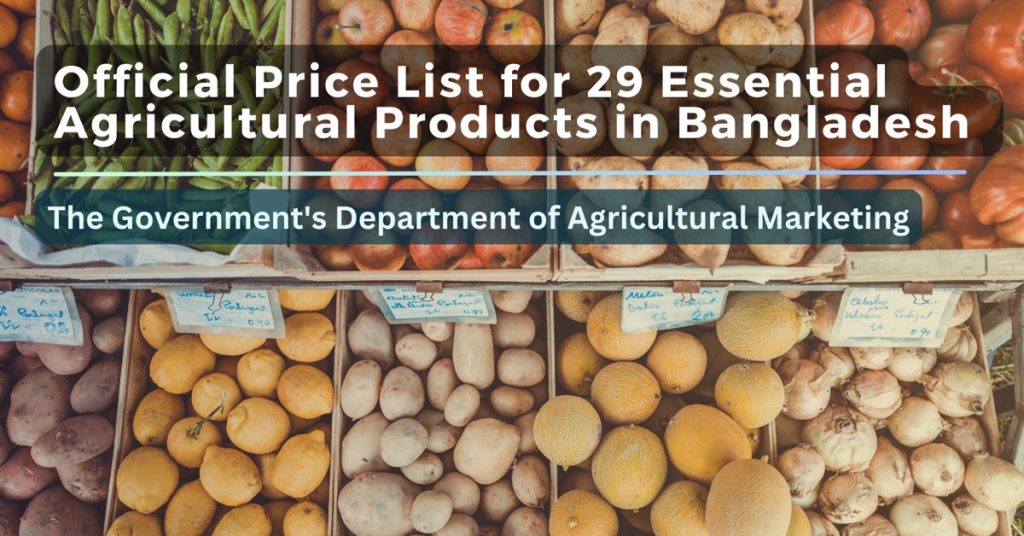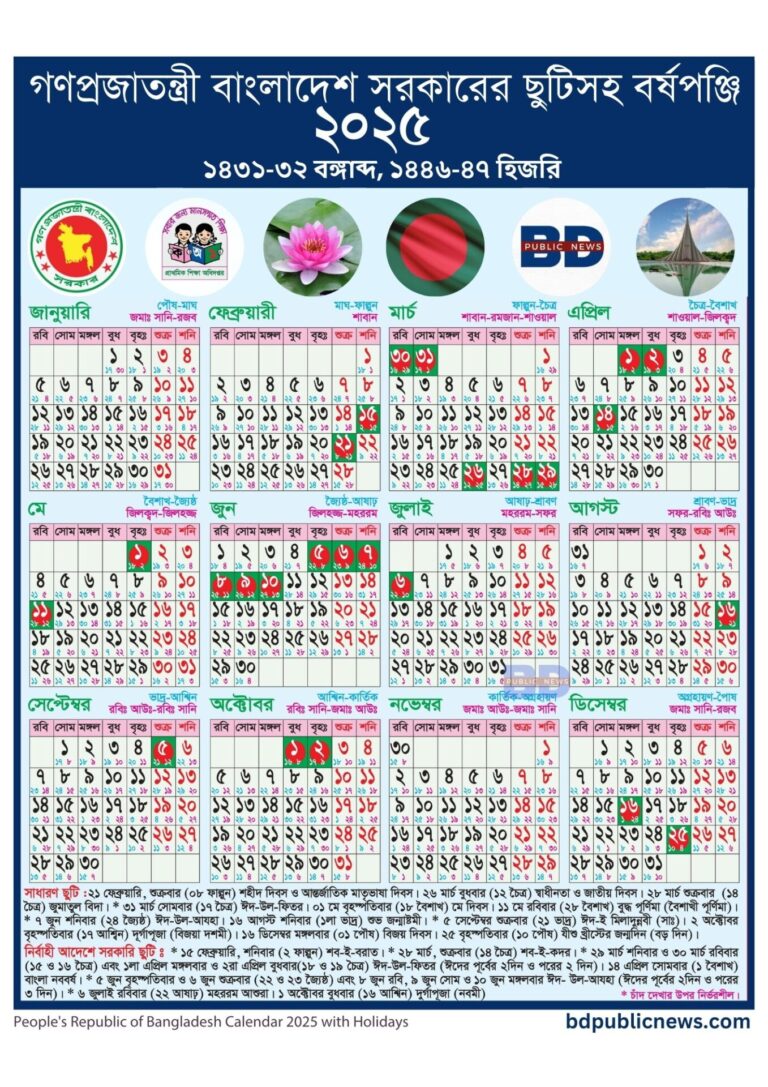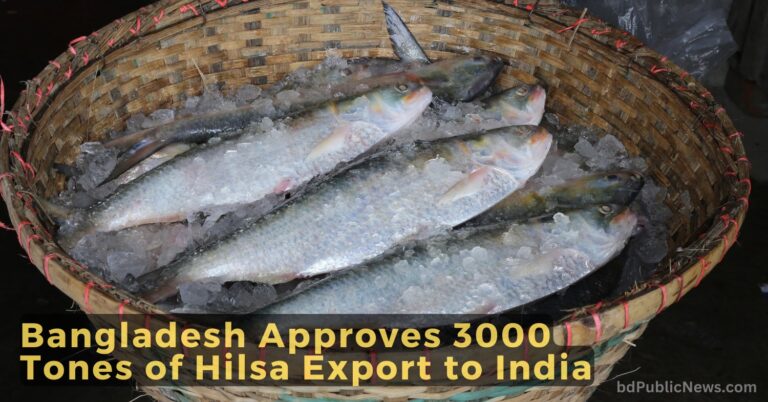Official Price List for 29 Essential Agricultural Products in Bangladesh Declared by Government
The Government’s Department of Agricultural Marketing has recently taken a significant step towards regulating the prices of essential agricultural products by issuing a notification setting prices for 29 items. This initiative, authorized under the Agricultural Marketing Act of 2018, is designed to create a fair pricing structure that benefits both consumers and producers, leading to a more stable and equitable market.
With agricultural product prices often subject to fluctuations, this measure introduces predictability and fairness into the marketplace. The government has detailed the production costs and established prices at the producer, wholesale, and retail levels, with the goal of shielding consumers from exorbitant costs while guaranteeing that producers obtain a reasonable return on their labor and investments.
For instance, the production cost for broiler chicken has been established at 145.78 BDT, with subsequent pricing set at 151.81 BDT for producers, 162.69 BDT for wholesalers, and 175.30 BDT for retailers. Beef production costs are marked at 587.50 BDT per kilogram, with prices defined at 605.13 BDT for producers, 631.69 BDT wholesale, and 664.39 BDT retail. The strategy is as much about establishing fair pricing as it is about fostering transparency and accountability in market practices.
The notification includes a comprehensive list of products and their respective production costs and price points. Here is a translated and summarized version of the table included in the document.
Table of Production Costs and Government-Mandated Prices (in BDT per Kilogram)
The document is an official communication from the Department of Agricultural Marketing under the Government of the People’s Republic of Bangladesh. It details the production costs and market prices of essential food items as mandated by Section 4(Jha) of the Agricultural Marketing Act of 2018. The directive aims to regulate the prices at which these essential commodities are sold to prevent overcharging. The list includes a variety of goods such as lentils, fish, meat, eggs, and vegetables, among others. Each item is listed with its production cost, producer price, wholesale price, and retail price in Bangladeshi Taka. This comprehensive pricing strategy is outlined to ensure fairness and transparency in the market, safeguarding consumer interests while supporting the livelihoods of farmers and producers. The document also specifies the distribution of this information to various government departments and local authorities for enforcement and oversight.
Here is a comprehensive table incorporating all the items listed in the document along with their respective production costs and prices for the producer, wholesale, and retail stages:
| Serial No. | Product Name | Production Cost (Taka) | Wholesale Price (Taka) | Retail Price (Taka) |
|---|---|---|---|---|
| 1 | Mung Bean (Fine) | 123.29 | 144.21 | 165.41 |
| 2 | Black Gram | 108.32 | 134.33 | 166.50 |
| 3 | Chickpea (Imported) | 85.67 | 90.37 | 98.30 |
| 4 | Lentil (Improved) | 117.50 | 120.45 | 130.50 |
| 5 | Lentil (Coarse) | 92.50 | 96.50 | 105.50 |
| 6 | Grass Pea | 75.00 | 80.58 | 92.61 |
| 7 | Pangas Fish | 114.75 | 135.29 | 180.87 |
| 8 | Catfish | 241.50 | 276.37 | 353.59 |
| 9 | Beef | 587.50 | 605.13 | 664.39 |
| 10 | Goat Meat | 875.00 | 903.82 | 1003.56 |
| 11 | Broiler Chicken | 145.78 | 151.81 | 175.30 |
| 12 | Sonali Chicken | 241.62 | 244.29 | 262.00 |
| 13 | Egg (Per Piece) | 8.81 | 9.05 | 10.49 |
| 14 | Native Ginger | 34.00 | 84.30 | 65.40 |
| 15 | Native Garlic (Per Kg) | 52.73 | 72.96 | 120.81 |
| 16 | Ginger | 103.40 | 112.20 | 120.20 |
| 17 | Dry Chili (Per Kg) | 158.45 | 217.22 | 327.34 |
| 18 | Green Chili (Per Kg) | 30.00 | 39.25 | 60.20 |
| 19 | Cabbage (Per Kg) | 12.03 | 19.10 | 28.30 |
| 20 | Cauliflower (Per Kg) | 14.30 | 20.30 | 29.60 |
| 21 | Eggplant (Per Kg) | 18.58 | 29.55 | 49.75 |
| 22 | Beans (Per Kg) | 27.60 | 34.85 | 48.00 |
| 23 | Potato (Per Kg) | 13.90 | 19.48 | 28.55 |
| 24 | Tomato | 9.60 | 21.25 | 40.20 |
| 25 | Sweet Pumpkin (Per Kg) | 8.00 | 12.35 | 23.38 |
| 26 | Date Palm (Zahidi) (Per Kg) | 144.00 | 149.10 | 185.07 |
| 27 | Flattened Rice (Thick) | 46.00 | 87.52 | 60.00 |
| 28 | Banana (Sagar) | 13.20 | 19.15 | 29.78 |
| 29 | Gram Flour | 74.37 | 84.87 | 121.30 |
This table represents the official price structure that is to be enforced immediately as per the government directive. The structured approach to pricing is a testament to the government’s dedication to maintaining market stability and ensuring fair trade practices. This list of prices is intended to act as a guideline for transactions in the market until further directives are issued, with immediate effect as mentioned in the notification.
The implementation of these prices will require collaboration between the Ministry of Commerce and the Ministry of Agriculture, with officials from both departments actively working on-site to oversee and ensure compliance. The National Consumer Rights Protection Department will also be crucial in ensuring adherence to the Agricultural Marketing Act, which includes various sanctions for non-compliance.
However, the challenge remains in implementing such price controls in a market-driven economy, where supply and demand play a decisive role in determining prices. Prior attempts at price regulation in commodities like soybean oil and sugar have seen mixed results due to market forces.
Despite these challenges, the optimism persists among officials from the Department of Agricultural Marketing regarding the viability of enforcing these new price controls. The prices were set after extensive consultations with all stakeholders, which should aid in ensuring widespread compliance and enforcement.
Consumer rights advocates warn that without improvements to the supply chain and market infrastructure, price controls may not be enough to guarantee market stability. They highlight the importance of supply and demand dynamics in a free market and suggest that interventions should be part of a comprehensive approach to addressing systemic issues in the agricultural sector.
In summary, the government’s effort to regulate prices for 29 essential agricultural products marks a proactive stance to safeguard fair pricing and consumer rights. The success of this policy will hinge on effective implementation and the collective effort of all participants in the market. It is vital to monitor the policy’s impact on the market and make necessary adjustments to overcome any challenges, ensuring that the benefits of stable pricing reach both consumers and producers.







